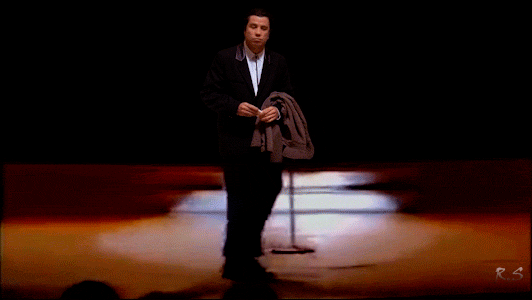Think of the relationship between “optimism”, “pessimism” and “realism”:
generally, those words are respectively interpreted as “focusing on the good things”, “focusing on the bad things” and “ignoring (or trying to ignore) personal biases on the topic at hand”.
In a way that makes sense, the universe defines our perception on things, not the other way around.
However, let’s suppose you just had a reality check, at least as my terminally online ass knows the term as.
That means something happened to you, that forced you to realize something about yourself - be it your body, your psyche, your knowledge about anything.
A realization so undeniable, that, despite your lizard brain’s psychological self-defense mechanisms’ censorship attempts, made you realize you’ve been wrong about something.
The reality check brings your mood down in the short term, and possibly pushes you to improve yourself (or, alternatively, to [concoct a workaround to the tyrannical laws of the universe]) in the long run, but… that’s not truly neutral, is it?
It may be a “bad” feeling possibly followed by a good outcome (see: cognitive dissonance), but it is never a GOOD feeling followed by a possibly bad outcome. The latter case is a confimation bias, if anything - the opposite of a reality check.
Going back to the first paragraph: if someone says “I’m not a pessimist, I’m a realist” you may conflate that person for an pessimist, but not an optimist.
 ___
___
I think of a reality check as bringing you back to a more neutral perspective? It may feel negative, but like you say thats just short term.
Reality being neutral, a reality check brings you back to that state?
As I was writing the body of the post, that’s pretty much the conclusion I came to.
There’s not much more I could say with my limited knowledge on philosophy and psychologywithout spreading misinformation or something.There’s an interesting book on psychology (by a nobel Prize winner) called “Thinking Fast and Slow”, Daniel Khaneman.
It’s called regression to the mean. The military said that yelling after bad pilots made them good and praising good pilots made them bad. Kahneman proved that yelling at them when they were good made them bad too and vice versa. It’s just that great pilots can sometimes be bad, and bad pilots can sometimes be good, it had little to do with how they pushed them. Along with loss aversion, people are pretty terrible judges of value.
Reality check is only negative for the person needing one in the sense that they might be upset that their view of reality is wrong.
Cognitive dissonance is s real phenomenon.
I like to think I’m right, and really don’t want to be proven wrong. Changing my mind about anything hurts my ego, so that’s why I don’t want to hear about anything that violates my thoughts, beliefs and biases.
So why is a “reality check” ALWAYS felt negatively?
When someone is being told they need a “reality check” its usually in response to that person proposing some overly ambitious or aspirational idea as being practical. So the “reality check” means that expectations need to be lowered to match reality.
Any fantasy by nature must be greater than reality, therefore any reality check must involve some kind of reduction from more fantastic to less fantastic.
Because people’s perception has a positive bias. Rationality corrects that bias towards neutrality, which if you place on a cardinal axis moves it left towards negativity.
This is the most baffling use of hypertext I’ve seen since the early 90s.
Anyway, the premise is flawed. You reality check a toxic optimist ignoring the likelihood of a bad outcome more often than a toxic pessimist, but it’s not always the case. Ultimately they’re all biases. It is true that being a self-proclaimed “realist” is often just an excuse to misbehave under the cynical assumption that a rule is systematically ignored and can’t be amended or enforced, though.
When I get stuck in a depression-spiral, or experience “imposter syndrome”, a reality check isn’t a negative experience: “Hey, dumbass, this is all in your head. You’re actually doing pretty damn good right now.”
neither good nor bad
well good for you. My reallity if fucking bad. Like I wish for any apocalipse at this point
I’d say a ‘reality check’ is not always negative.
Say you’re very, very self conscious in public, always nervous about how others percieve you.
But then, one day, a friend pulls you aside and ‘reality checks’ you with:
“Look, in 90% of situations you’ll ever be in, if you can follow a few basic dress and behavioral rules, you’ll be fine. Barring situations where the whole idea is you making a good first impression… most people, most of the time, in most situations… really don’t care that much.”
Things like that are arguably ‘positive’ reality checks.
The reason why ‘reality check’ is often connotated negatively is because most of the time, cognitive dissonance develops as a way of excusing or justifying harmful or irresponsible behavior or inaction, all things that mean you are living in a mild to serious delusion which can no longer be maintained, and will require a lot more effort to grapple with.
But it can be the case that reality is in someway better than it is perceived by someone who is overly critical or peasimistic in some way.
In some sense, the initial realization that you’ve been incorrect about something is negative in that you may be embarassed about being wrong in the past, but if it actually means a more realistic outlook going forward, which is actually less troublesome, easier to exist with/in, then I’d say thats overall a ‘positive’ reality check.
Because someone ignoring reality is often a negative.
That’s a very interesting take. Especially realist vs pessimist. However, I’ve definitely used ‘reality checks’ on people who were down on themselves. It represents an alternate perspective, that can be considered or rejected.
Because reality has a well known liberal bias.
Reality is bad. Go to http://soulism.net/ to read the antirealist manifesto












